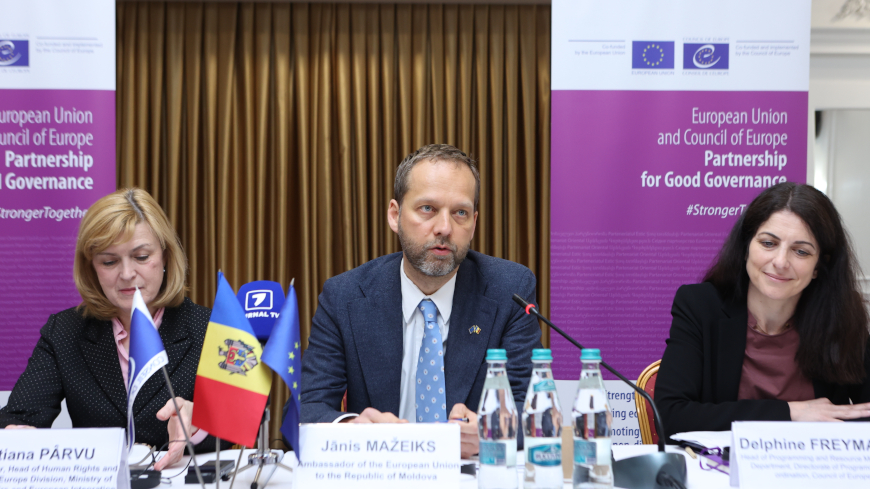New projects aimed at modernising the justice administration, facilitating access of women to justice, fighting economic crime, promoting equality and non-discrimination, as well as enhancing the effectiveness of anti-money laundering and terrorist financing were presented on Wednesday 26 April, in Chisinau as part of the third phase of the joint EU/Council of Europe Partnership for Good Governance (2023-2027) programme.
In this context, the Delegation of the European Union to the Republic of Moldova and the Council of Europe, together with 45 representatives of national partner institutions, discussed joint actions at the first Local Steering Committee meeting for the new phase of the Partnership for Good Governance (PGG) for the Republic of Moldova.
"The EU is very glad to officially start Phase III of the EU/Council of Europe Partnership for Good Governance. A successful fight against corruption, an effective implementation of the Republic of Moldova’s Justice Reform as well as strong human rights will be key on the Republic of Moldova’s path towards EU membership. Six new projects under our successful Partnership will help increase court efficiency, enhance the Republic of Moldova’s anti-money laundering and asset recovery regime, help combat discrimination, hate speech and hate crimes, and strengthen access to justice for women victims of violence over the next four years." stated Jānis Mažeiks, Ambassador of the European Union Delegation to the Republic of Moldova.
"The Council of Europe and the European Union were and continue to be an inherent reference when we talk about democratic reforms in the Republic of Moldova. The support offered over the years contribute to the promotion of an inclusive and pluralistic society, to the country’s sustainable development, including ensuring an independent justice, building and consolidating transparent and accountable institutions." said Ambassador Tatiana Pậrvu, Head of Human Rights and Council of Europe Division, Ministry of Foreign Affairs and European Integration of the Republic of Moldova.
"While building on the results achieved under the previous phases of the PGG, the Programme will now provide support to the country in its accession priorities’ related agenda, based on Council of Europe standards. Thanks to its flexibility, PGG will continue to address emerging needs of the national partners." mentioned Delphine Freymann, Head of the Programming and Resource Mobilisation Department, Directorate of Programme Co-ordination, Council of Europe.
Three country-specific projects will be implemented in the Republic of Moldova, with a total budget of 1.7 million euros, co-funded by the EU and the Council of Europe. The projects will build on the results of the previous phases and will continue aiming at combating discrimination, hate speech and hate crime to strengthen tolerance, inclusion, and diversity.
At regional level, three projects will be implemented in Eastern Partnership countries, including the Republic of Moldova. The regional projects will aim at fighting economic crime, promoting equality and non-discrimination, and facilitating access of women to justice. Their purpose is to encourage networking, provide a platform for sharing lessons learned and best practices, and, where relevant, complement country-specific projects.
The “Partnership for Good Governance” (PGG) is a joint initiative of the European Union and the Council of Europe for strengthening good governance in the Eastern Partnership region.





